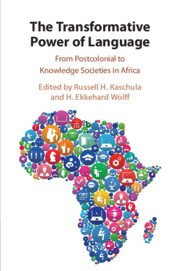Book contents
- The Transformative Power of Language
- The Transformative Power of Language
- Copyright page
- Contents
- Figures
- Tables
- Contributors
- Preface
- Abbreviations and Acronyms
- Introduction
- Part I Mental Decolonisation and Cultural Diversity
- Part II Multilingualism and Intellectualisation of African Languages
- Part III Digitalisation and Democratisation of Knowledge
- 10 African Language Resources for Knowledge Societies
- 11 Wikipedia as a Transformative Multilingual Knowledge Resource
- 12 Corpora as Agency in the Intellectualisation of African Languages
- 13 From Postcolonial African Language Lexicography to Globally Competitive e-Lexicography in Africa
- Part IV Interlingual and Intercultural Cross-Fertilisation
- Index
- References
13 - From Postcolonial African Language Lexicography to Globally Competitive e-Lexicography in Africa
from Part III - Digitalisation and Democratisation of Knowledge
Published online by Cambridge University Press: 18 September 2020
- The Transformative Power of Language
- The Transformative Power of Language
- Copyright page
- Contents
- Figures
- Tables
- Contributors
- Preface
- Abbreviations and Acronyms
- Introduction
- Part I Mental Decolonisation and Cultural Diversity
- Part II Multilingualism and Intellectualisation of African Languages
- Part III Digitalisation and Democratisation of Knowledge
- 10 African Language Resources for Knowledge Societies
- 11 Wikipedia as a Transformative Multilingual Knowledge Resource
- 12 Corpora as Agency in the Intellectualisation of African Languages
- 13 From Postcolonial African Language Lexicography to Globally Competitive e-Lexicography in Africa
- Part IV Interlingual and Intercultural Cross-Fertilisation
- Index
- References
Summary
This chapter departs from a description of transformation in African language lexicography from a Eurocentric approach where dictionaries for African languages were compiled by foreigners to an Afrocentric approach in which mother-tongue speakers of African languages take responsibility for the compilation of African language dictionaries. A Eurocentric approach to dictionary compilation for African languages refers to the colonial period where dictionaries were mainly compiled by missionaries to fulfil their own lexicographic needs, that is, to spread the gospel. Afrocentric refers to dictionary compilation for African languages in Africa by Africans in a ‘postcolonial society’, that is, projects likely to thrive as compilers have sentimental attachment to it. The main focus in the chapter, however, is on the subsequent required transformation process for multilingual lexicography in Africa from a ‘postcolonial society’ to a ‘globally competitive knowledge society’, mainly in respect of a fresh start to the compilation of reference works in the electronic era. Sesotho sa Leboa (Northern Sotho) is taken as a case in point.
Keywords
- Type
- Chapter
- Information
- The Transformative Power of LanguageFrom Postcolonial to Knowledge Societies in Africa, pp. 259 - 274Publisher: Cambridge University PressPrint publication year: 2020
References
- 2
- Cited by



